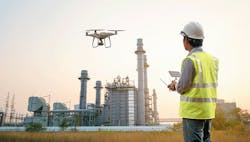Guillermo was aiming to hit the local polling place to cast his vote on the way to the plant when he realized his smart phone (a.k.a. pocket computer) was about to shut down from lack of battery power. Once every year or two, he had to find his voting place in a tiny town in the hinterlands. That morning, he worried he’d missed his turn, lacking the GPS assistance common in cellular appliances. The Internet, once a hobby of computing dilettantes, is now the pervasive media without which objective reality becomes befuddling and uncomfortable. “Where’s my phone?” is the anxious plea I seem to hear routinely.
Helplessness when we're without our digital aids pervades the workplace as well. Chances are you haven’t had an administrative assistant for 20 years. Texting and other messaging apps have supplanted email, which in turn free us to communicate asynchronously.
Are our electronic assistants more of a crutch than other tools, like a cordless leaf blower? We can think of them as servants, as they free us from the need to hire a “human” assistant. But like the lords and ladies of the Edwardian era, we might find ourselves increasingly out of touch with “real” reality. Neural as well as physiological capacities tend to atrophy, and societies grapple with ensuing corpulence and mental lassitude.
Meanwhile, corporate leaders besieged by the pandemic, see the evolution of cars that don’t require drivers and ask, "Why can’t our process plants be driverless?" They’re struggling to recruit capable individuals, willing to undertake stressful responsibilities that might include a shift-long break from the comfort and entertainment provided by their smart phone. But even for potentially six-figure compensation, the level in today’s talent reservoir seems perilously low.
Automation is accepted today as a path to productivity, arguably freeing the factory worker from mindless, repetitive tasks. Hazard analyses take less credit for operator training and competence, and mitigation of hazards increasingly relies on automated interlocks. If operators are simply following rote procedures and ruts in reaction to deviations and alarms, why can’t one relegate all their duties to automation or robots? If we think our process plants exist in a binary if-then-else, fault-tree reality, it seems conceivable.
What makes us different
If you don’t feel ready to trust your process plant to a robot, we should emphasize what essential qualities the human operator has. One might be curiosity, also the namesake of a highly automated NASA rover currently on another planet about 130 million miles away. But the automaton on Mars exhibits little curiosity beyond that compelled or programmed by human scientists and engineers. One can imagine the same scenario for a process plant, where drones interact with equipment on behalf of a remote operator, but one would still expect the human’s curiosity to motivate any pursuit of deeper process knowledge.
A more essential aptitude we desire in human operators is worry. We don’t want employees with heartburn or hypertension, but we do want them to share the worries of engineers and management. Can the plant hang on in a bad electrical storm? What happens when the lube oil gets too old, hot or cold? In a recent Wall Street Journal essay, entitled “In Praise of Anxiety,” Professor of psychology and neuroscience Tracy Dennis-Tiwary explains why she contends “mental health professionals have made a terrible mistake.” Efforts to eliminate anxiety rob us of an important and non-robotic faculty, she writes. “Anxiety places us in the 'future tense' (pun intended)—a state in which we're motivated not only to survive but to thrive by being more persistent, hopeful and innovative.” Show us a robot that can do that.
It's that anxiety that makes us a better driver, as we worry about unpredictable actions, events and consequences. It’s arguably the key attribute we seek in human stewards of the process. Without it, they might as well be robots.



